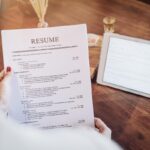
Curriculum vitae for Entry / Re-entry
It can be difficult for people who are new to the profession without work experience and those who are returning to work again to write a CV. We tell you which information is really important.
Whether it’s about being convincing without professional experience or skilfully describing a longer break: the CV for starting a career or returning to work contains a few special features that you should pay attention to. This guide will show you the best way to present your resume.
CV for young professionals
Relevant professional experience is the strongest argument in your CV – but career starters in particular cannot refer to it. However, there are numerous other ways you can make your resume stand out. In the following we will show you what information your CV should contain as a career starter and how you can structure it.
The path of education
As a career starter, your education is the focus of your CV. This includes your school education as well as your professional and academic training. Always start with your current degree and list your education in reverse chronological order. Enter the period with the exact month and year.
You also have the option of naming both your final grade and the focal points of your education. If you have a good high school diploma with the majors in English and German, this will definitely be a plus point for your application as an interpreter.
Practical experience
If you have already taken the first steps in professional life, for example through a part-time job, internships or as a temp in your parents’ business, you should definitely state this in your CV. It is of course advantageous if these stations have a connection to the desired location. However, you should include them even if you don’t. It shows that you already have practical experience and know what it’s like to work.
Experience abroad
You can either state your experience abroad in your educational path or highlight it in a separate category. If, for example, you did work and travel for a year, that is a convincing argument in your CV as a career starter. Experience abroad indicates independence, good organization and language skills.
Knowledge and skills
Of course, in addition to your education, there are other criteria that qualify you for a job. This includes knowledge and skills that you may have taught yourself – like writing in HTML code. You can also list your language skills here. Maybe you are also particularly familiar with a program, then you can describe here again which activities you actually carried out.
Hobbies
You also have the opportunity to put yourself in a positive light with your hobbies – of course it depends on how you present yourself. Hobbies like reading and watching Netflix offer no added value for the HR manager. On the other hand, if you are active in your local football club, you appear committed and organized. Hobbies like drawing or writing are a testament to your creativity.
Structure of the CV
In addition to the content, an appealing look and structure is of course also important. Your CV should contain the following information:
- personal data
- educational path
- work experience
- knowledge and skills
- hobbies/volunteer activities
- signature
In our guide you will find numerous tips for the correct structure of your CV as well as templates for the design.
CV for re-entry
After a longer career break, it can be quite difficult to adapt your CV to the current situation. Because there are both positive and negative reasons for an interruption. We’ll tell you how to write a resume for your professional return.
Reasons for a career break
There are a variety of reasons that lead to such a break in professional life and not everyone requires a detailed explanation. Below we list some of the most common reasons and explain how to present them skillfully on your CV.
1. Sabbatical
Just get out of everyday life and explore the world – many employees who have been working for a long time allow themselves a break to travel. In your CV, you should not describe this time as a mere “journey” or even as a “holiday”. Title it “sabbatical” or “private travel time” and mention where you’ve been and what you’ve been doing during that time. Maybe you even did a job and can also note this on your CV.
2. Maternity leave
Parental leave usually doesn’t need much explanation, but you shouldn’t call this time off “parental leave” because it’s not a recovery phase. Be prepared that the offspring will be addressed in the interview . By then at the latest you should mention that the children are looked after and that nothing will distract you from your work.
3. Caring for a relative
Caring for a close relative can also be mentioned as such without much explanation. However, it is a good idea to note that the relative no longer needs your help if you want to get back to work.
4. Own illness, stroke of fate
Applicants who dare to return to work after a serious illness or a stroke of fate often do not know how to indicate this phase in their CV.
Don’t worry, you don’t have to explain your private problems in your CV. A reference to “career leave for family reasons” or “career leave for health reasons, fully recovered since MM/YYYY” is sufficient. It is important that you point out that you are fully able to work and perform well again.
5. Unemployment
Many applicants who want to return to work after a long period of unemployment worry about how to present this on their CV. Although gaps in the CV are not welcomed, they have long ceased to be an exclusion criterion. Be careful not to name the period “unemployed” but with terms such as “job-seeking” or “professional reorientation”.
You can also state the reason for your termination if it was not your fault – for example because of the bankruptcy of your former employer. “Dismissal due to company insolvency, then looking for a job.”
6. Continuing education
A career break to further your education, for example by completing a postgraduate or second degree, is referred to as a “false gap” . After all, it is an investment in your professional future. You can then easily state this in your educational path.
Sideline activities
As a returnee, you must prove your ability to perform in your CV. You have to prove that you still have the necessary professional skills after a longer career break.
For this reason, it is helpful if you have also promoted skills that are important in your job during your time off: This could be a part-time job during your parental leave, a voluntary internship during your unemployment or an online course while caring for a family member . It is best to add this to your CV immediately after your professional break, i.e.:
Private hobbies and interests can also put you in a positive light: for example, did you help out in your child’s football club during your parental leave? This shows your willingness to help and your organizational skills. With this information you present important soft skills that may be relevant for your new position.
CV Re-entry: the structure
It is important to deal with a longer professional sabbatical correctly – only unexplained gaps in your CV make a bad impression. Nevertheless, your professional qualification should be the focus. In the CV for your return to work, you should therefore not draw too much attention to your professional break. It is therefore advisable not to name them at the beginning of your CV.
Still, it shouldn’t seem like you’re trying to hide them. If you are currently looking for a job, it is advisable to list your professional experience in chronological order. In this way, the recruiter first sees your previous experience and only learns at the end that you are currently not employed – at this point, however, he has already got a good impression of your skills.
However, some time off, such as parental leave or caring for a close relative, is also seen as positive. If so, you can list them in a separate category called “Family Time.”
Finding a Job, CAREER PATHS, Communication and Networking, CV and Cover Letter, JOB HUNTING, Job Interview Tips, Salary Negotiation and Job Offer, Training and Development







